|






Click the flag
Meet our special
U.S. Publishers
|
ECE
Child Development/Guidance
Back to Early Childhood Education Booklists
Featured
Books in this Category / Main
Booklist

Featured
Books
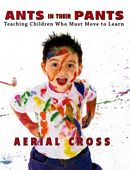
|
Ants in Their
Pants: Teaching Children Who Must Move to Learn. Aerial Cross,
$39.95
Extra busy children — children
who must move to learn — demand non-traditional
environments and teaching methods. By focusing on the kinesthetic
nature of these children this practical, hands-on resource
is filled with transition ideas, sensory-play activities, advice
and inspiration for teachers, caregivers and parents. |
|
|
The Art of Awareness: How Observation
Can Transform Your Teaching, 2nd Edition. Deb Curtis & Margie Carter, $58.95 (ages birth to 5)
The art of observing children is more
than merely the act of watching them—it is also using what you see and hear to
craft new opportunities in your classroom. This resource provides a wealth of
inspiration and practice. It will help you learn to observe in new ways. You'll
witness children's remarkable competencies as they experience childhood, and
find new joy in your work with children.
- Ten study sessions to help you advance your
skills and practice observing children from different points of view
- Stories, photographs, and classroom reflections
modeling the ways observation can be used and displayed in your own teaching
- Activities to help you notice and appreciate
what you see
- New ideas and strategies to organize your
observations, share them with colleagues and families, and apply them to
planning and assessment processes
- Emphasis on cultural awareness, observing
through an objective lens, and using technology as an observation tool
|
|
|
Behaviour in the Early Years, 2nd Edition. Angela Glenn, Jacquie Cousins & Alicia Helps, $36.50
Behaviour in the Early Years provides hands-on, tried and true strategies to help you respond effectively to behavior problems. The book helps you to understand why children behave the way they do and to encourage them to problem solve in difficult situations. |
Back to top
|
|
Beyond Behavior Management:
the Six Life Skills Children Need, 2nd Edition. Jenna Bilnes,
$41.95
All children — not just those with
challenging behaviors — require guidance as they develop the social and emotional
skills they will use the rest of their lives. This resource provides everything
you need to help children build and use six essential life skills: attachment,
belonging, self-regulation, collaboration, contribution, and adaptability.
Developed and tested in the classroom, this strength-based approach includes
strategies, examples of supportive interactions, and special activities to help
you manage challenging behaviors and strengthen social and emotional
development in all children. With these essential life skills, children will
exhibit more prosocial behaviors, work better as a classroom community, and
become excited and active learners. |
|
|
Child Development for Child Care and Protection Workers, 2nd Edition. Brigid Daniel, Sally Wassell & Robbie Gilligan, $34.95
Child Development for Child Care and Protection Workers summarizes important current thinking on child development and applies it directly to practice. The book covers key issues such as resilience and vulnerability and the impact of protective or adverse environments. Different stages of development (infancy, school age and adolescence) are discussed, and attachment theory is used to offer insights into the impact of abuse and neglect on development. This book encourages practitioners to consider each child as an individual with unique circumstances, and links theory and practice in an imaginative and sympathetic way. |
|
|
Common
Psychological Disorders in Young Children: a Handbook for Child
Care Professionals. Jenna Bilmes & Tara Welker, $34.95
Common Psychological Disorders in
Young Children is an easy-to-use guide that will help you recognize
and deal with the symptoms and behaviors associated with ADHD, autism,
anxiety, and other disorders you may face in your classroom. Learn
to notice behaviors that may require referral for diagnostic screening
and, for children already diagnosed, understand the reason a child
might be exhibiting certain behaviors and how you can best help
the child within your setting. |
Back to top
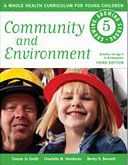
|
Community and Environment: Activities for Age 3 to
Kindergarten, 3rd Edition. Connie Jo Smith, Charlotte Hendricks & Becky
Bennett, $17.95
Children develop a sense of security and self-worth by
becoming familiar with themselves, their home, and the world around them. This
curriculum includes thirty-six activities that help children build connections
with their community and foster positive feelings about health and safety
personnel. This book includes:
- An overview of the community and environment topics covered in
the curriculum
- Suggested interest area materials and supports for creating the
learning environment
- Learning objectives and vocabulary words
- Suggestions for evaluating children's understanding of each
community and environment topic
- More than 30 classroom activities
- Family information and take-home activities
|
|
|
Culture
and Child Development in Early Childhood Programs: Practices
for Quality Education and Care. Carollee Howes, $36.95
Early childhood education programs
are expected to provide exemplary care for all children while also
adapting care to include children’s
families and cultures. These two sets of expectations are often difficult
for teachers and programs to meet. In this book, Carollee Howes shows
how high-quality programs successfully adapt child development guidelines
within cultural contexts, and why quality needs to be and can be
measured in culturally specific ways. |
Back to top
|
Developing Attachment in Early Years Settings:
Nurturing Secure Relationships from Birth to Five Years. Veronica Read,
$48.95
Providing an accessible introduction to attachment
thinking, this practical book offers early years practitioners' advice on
translating attachment principles into practice in their settings. It clearly
explains how knowledge about attachment theory underpins everyday practice and
highlights the crucial role of secure attachments in young children's learning
and development. Developing Attachments in Early Years Settings examines
the importance of emotional' 'holding' and the nurturing of individual
relationships within group childcare. The book aims to help you make a real
difference to young children's sense of self and emotional security by being 'tuned
in', available, responsive and consistent. |
|
The Developing Brain Birth to Age Eight. Marilee
Sprenger, $21.95
Synthesizing information from neuroscience,
cognitive psychology, and child development, author Marilee Sprenger
covers the basic structure, vocabulary, and current research on
the brain from an early childhood educator's point of view and provides
an abundance of illustrations and descriptions. Through an understanding
of the phases of language, motor, and social development at each
age level, educators can create enriching educational experiences
that enhance children's growth and foster an enduring love of learning. |
|
Developing Thinking &
Understanding in Young Children, 2nd Edition. Sue Robson, $45.50
DEVELOPING THINKING AND UNDERSTANDING IN
YOUNG CHILDREN presents a comprehensive and accessible overview of
contemporary theory and research about young children’s developing thinking and
understanding. Aimed at all those interested in how young children develop
through their thoughts and actions, Sue Robson explores:
- Theories of cognitive development
- The social, emotional and cultural contexts of
children’s thinking
- Children’s conceptual development
- Approaches to supporting the development of
young children’s thinking and understanding
- Latest developments in brain science and young
children
- The central roles of play and language in young
children’s developing thinking
Including a new chapter on young
children’s musical thinking, expanded sections on self regulation,
metacognition and creative thinking and the use of video to observe and
describe young children’s thinking, this book will be an essential read for all
those studying the early years and childhood education. |
Back to top
|
A Developmental Approach to Educating Young Children. Denise Daniels & Patricia Clarkson, $40.75
The early school years provide critical opportunities for children to develop foundational skills and positive attitudes toward learning. This book offers valuable insight into how young children feel, think, and learn.
Vignettes and case studies, practice exercises, suggested games, and reflection questions make A Developmental Approach to Educating Young Children a valuable asset in helping teachers design stimulating learning experiences for young children.
|
|
Developmentally Appropriate Practice
in Early Childhood Programs, 3rd Edition: Serving Children from
Birth through Age 8. Carol Copple & Sue
Bredekamp, Editors, $47.99
Based on what the research says about
development, learning, and effective practices, as well as what experience
tells us about teaching intentionally, DEVELOPMENTALLY APPROPRIATE
PRACTICE IN EARLY CHILDHOOD PROGRAMS articulates the principles that
should guide decision making. Chapters describe children from birth through age
8 in detail, with extensive examples of appropriate practice for
infant/toddler, preschool, kindergarten, and primary levels. This revised
edition comes with a supplementary CD containing readings on key topics, plus
video examples showing developmentally appropriate practice in action. |
|
Don’t Get So Upset! Help Young Children Manage Their Feelings
by Understanding Your Own — a Guide for Caregivers. Tamar
Jacobson, $19.50
Young children convey their emotions
in many ways. Don’t Get So Upset is an insightful look at why some
expressions of children’s emotions are so much more challenging
than others — it’s not about the child as much as it is about you
and your emotions.
Author Tamar Jacobson asks the reader
to reflect on how they learned to express their feelings as a child,
how adults responded to them and how our emotional history is very
much a part of our interactions with children. This book is practical
and personal — a call for self-reflective practice in early childhood
education. |
Back to top
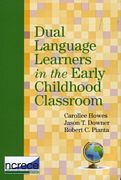
|
Dual Language Learners in the Early
Childhood Classroom. Edited by Carollee Howes,
Jason Downer & Robert Pianta, $40.95
The school readiness of young dual
language learners depends on high-quality preschool programs that meet their
needs— but how should schools promote and measure the progress of children
learning two languages? Find out what the research says in this authoritative
resource, which investigates the experiences of dual language learners in
preschool classrooms and the policy implications of these critical findings. |
|
|
Early Childhood Theories and Contemporary Issues: an
Introduction. Mine Conkbayier & Christine Pascal, $34.50
Having a good grasp of the theories of child development
and how these translate into practice can make a positive difference to how you
understand babies and children and the ways in which you can help them learn.
This approachable guide offers easy access to a wide range of concepts, as well
as classic and current theories, about how babies and children learn.
Each chapter offers clear guidance on how to recognise the theory in action and
suggests ways to test these ideas out in early years settings, supporting the
development of reflective practice. Case studies are included throughout, along
with questions to guide thinking and encourage readers to develop their
practice. Summaries conclude each chapter offering a quick reference of the
theory examined and the benefits of applying it to practice. |
|
Early Sprouts: Cultivating Healthy Food Choices
in Young Children. Carrie Kalich, Dottie Bauer & Deirdre
McPartlin, $28.95
Plant lifelong healthy eating concepts in young children with Early
Sprouts. This “seed-to-table” approach gets
children interested in and enjoying nutritious fruits and vegetables.
The Early Sprouts model engages preschoolers in all aspects
of planting, preparing, and eating organically grown produce.
Find directions for designing and caring for gardens, recipes
children can help prepare, and ways to involve the whole family
in making healthy food choices. The activities can be tailored
to fit any early childhood program, climate, or geographical
region. No space for a garden? Many of the benefits of the Early
Sprouts program can be achieved in other ways, including
visits to a farmer’s market and small-container gardens. |
|
|
Easy Daily
Plans: Over 250 Plans for Preschool Teachers. Sue Fleischmann,
$34.95
Easy Daily Plans has everything a teacher needs for a
complete year’s worth of daily plans. Organized by month, this great
grab-and-use curriculum has over 250 daily plans that teachers can
use to plan fun and enriching activities for young children. The
beginning of each chapter lists month-long celebrations, week-long
celebrations, holidays, and significant dates to help with planning.
|
Back to top
|
|
Enhancing Early Child Development: a
Handbook for Clinicians. Durriyah Sinno, Lama
Charafeddine & Mohamad Mikati, $42.95
ENHANCING EARLY CHILD DEVELOPMENT is a
quick reference guide for pediatricians, clinicians, and pediatric nurse practitioners
that aims at promoting early stimulation and intervention for optimizing
development of normal children as well as children with cerebral palsy and
autism. Designed to be used in daily practice, this book will provide counsel
for clinicians, parents and caregivers and advise them on the appropriate
methods to enhance their child's development at different ages based on their
health condition. |
|
|
Enhancing Learning through Play: a
Developmental Perspective for Early Years Settings, 2nd Edition. Christine Macintyre, $38.95
Written to support early years
professionals who are fascinated by the complexities and implications of early
development, this fully updated second edition explains why children need to
play and offers practical guidance on how best to support children's
development and learning through play.
Based on a wealth of research in the
field, this accessible and engaging book explores why children behave as they
do at different ages and stages in their development and shows how play can
complement and enhance their social, emotional, perceptual, motor and
intellectual development. The author shows how detailed observations of
children at play can lead to providing the most appropriate learning
opportunities for children with different aptitudes and abilities. |
|
The Essence of Play: a Practice Companion for
Professionals Working with Children and Young People. Justine Howard & Karen McInnes, $43.95
Play acts as a natural resource for children to met
physical, intellectual, and emotional challenges. This book considers play from
the perspective of children, rather than adults, exploring the fundamental
value of play rather than a ‘how to’ approach. This book is written for
students and professionals working with children across helping professions,
including early childhood education, play therapy, childcare, social care,
nursing, and allied health. |
Back to top
|
The Feeling Child: Laying the Foundations of
Confidence and Resilience. Maria Robinson, $36.95
THE FEELING CHILD thoughtfully discusses the key
principles of children’s emotional and behavioural development alongside
descriptions of everyday practice. It clearly explains how a child’s early
experiences influence their particular behaviours towards different people and
different situations.
Throughout the book, Maria Robinson considers the key
characteristics of effective learning and shows how play is one of the key
mechanisms that children use in their discovery of themselves and the world
around them. Emphasising the importance of understanding the theory that
underpins children’s emotional development, this accessible text shows
practitioners how they can use this knowledge to provide learning opportunities
that nourish children’s thinking and creative skills. |
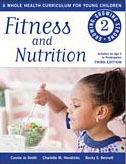
|
Fitness and Nutrition: Activities for Age 3 to
Kindergarten, 3rd Edition. Connie Jo Smith, Charlotte Hendricks & Becky
Bennett, $17.95
Given the recent rise of childhood obesity, the need for
health education is needed more than ever. This curriculum provides more than
30 developmentally appropriate activities that introduce important health
concepts, including physical activity, rest and relaxation, and nutrition and
eating habits. This book includes:
- An overview of the fitness and nutrition topics covered in the
curriculum
- Suggested interest area materials and supports for creating the
learning environment
- Learning objectives and vocabulary words
- Suggestions for evaluating children's understanding of each
fitness and nutrition topic
- More than 30 classroom activities
- Family information and take-home activities
|
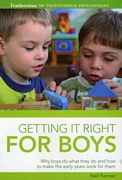
|
Getting It Right for Boys: Why Boys
Do What They Do and How to Make the Early Years Work for Them. Neil Farmer, $30.00
For boys to become competent and
confident, they need to learn to assimilate new skills and knowledge, to
empathize, to see themselves as capable and creative. Yet often their physical
and emotional lives are ignored in traditional learning centres. This book will
appeal to all practitioners and parents who are interested in how boys develop
and how they give them the best possible start in life. |
Back to top
|
|
Good Morning,
Children: My First Years in Early Childhood Education. Sophia
Pappas, $20.95
Based on her popular Pre-K Now blog,
Sophia Pappas’ book Good Morning, Children provides
an up-close and personal view of the challenges and successes
of a beginning teacher. The book describes daily encounters
with students, family members, and administrators; reflects
on the state of early childhood education in America; and celebrates
the ways the pre-K teacher can help prepare every child to
succeed in both school and life. |
|
|
The Great Disconnect in Early Childhood Education:
What We Know vs. What We Do. Michael Gramling, $33.95
Over the years, most reforms in early childhood education
have been well-intended, yet have not kept up with the needs of young children
and educators in the classroom. Author Michael Gramling provides an historical
overview of how educational policies came into effect and how they are driving
educational practices. Gramling argues that ineffective practices are the
result of unexamined public policies and asserts that educators need to
challenge this kind thinking in order to make a difference in children's lives
Powerful, thought provoking stories will inspire you to examine the problems
and challenge you to envision a preschool classroom that works for all
children. |
|
|
Growing Minds: Building Strong
Cognitive Foundations in Early Childhood. Edited by Carol Copple, $29.99
From the beginning of life, young
children’s learning and activities depend on their cognitive capabilities and
development. To cope with the environment they live in, children need to learn
about their physical and social worlds; acquire language; regulate their
bodies, emotions, and thoughts; and gain competence in literacy,
mathematics, science, and other knowledge domains. This collection of readings
outlines important dimensions of their early cognitive development and
describes approaches for promoting it. |
Back to top
|
|
Handbook of Child Development and Early Education: Research to Practice. Edited by Oscar Barbarin & Barbara Hanna Wasik, $93.50
How and what should young children be taught? What emphasis should be given to emotional learning? How do we involve families? Addressing these and other critical questions, this authoritative volume brings together developmentalists and early educators to discuss what an integrated, developmentally appropriate curriculum might look like across the preschool and early elementary years. State-of-the-science work is presented on brain development and the emergence of cognitive, socioemotional, language, and literacy skills in 3- to 8-year-olds. Drawing on experience in real-world classrooms, contributors describe novel, practical approaches to promoting school readiness, tailoring instruction to children's learning needs, and improving the teaching of language arts, math, and science. |
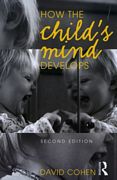
|
How the Child’s Mind Develops, 2nd Edition. David Cohen, $43.50
- How do we get from helpless baby to knowing
teenager?
- What impact do television, computers, the
internet, video games and evolving technology have on the way children's minds
develop?
- Is cognition a question of learning and
environment or of heredity?
How we learn to think, perceive,
remember, talk, reason and learn is a central topic in psychology - and one
that sees constant new research. In this very readable book, David Cohen
examines the fundamental issues of how children learn to read and write, of how
their intellectual abilities are measured and the development of their
morality. He examines child crime and looks at how modern media affect the way
the child's mind develops.
HOW THE CHILD'S MIND DEVELOPS is an
integrated and thought-provoking account of the central issues in child
development. Parents, professionals and students will find it an invaluable
introduction. |
|
|
How to Handle Hard-to-Handle
Preschoolers: a Guide for Early Childhood Educators. Maryln
Appelbaum, $27.95
This user-friendly resource provides
early childhood educators with a comprehensive overview
of the most common kinds of behavioral disorders and learning
disabilities in children ages 2 to 5, with guidelines for
meeting students’ needs within an inclusive environment.
This ready-to-go guide is packed with hundreds of easy-to-implement
strategies, tips, and techniques for managing behavioral
disorders—from ADHD to Tourette's syndrome. |
Back to top
|
|
Inclusive Lesson
Plans Throughout the Year: Early Childhood. Laverne Warner,
Sharon Lynch, Cynthia Simpson & Diana Nabors , $34.95
Inclusive Lesson Plans Throughout
the Year has over 150 lesson plans for teachers who have children
with special needs in their early childhood classrooms. Perfect
for both beginning teachers and veteran teachers, Inclusive
Lesson Plans Throughout the Year helps new teachers develop
plans for each day and provides veteran teachers with new ideas
and approaches to add spark to their classroom teaching. |
|
Incredible Teachers: Nurturing Children’s Social,
Emotional, and Academic Competence. Carolyn Webster-Stratton, $42.95
Incredible Teachers is for day care providers
and teachers of young children ages 3-8 years. The book presents a variety of
creative classroom management strategies for teachers to use to meet children’s
developmental milestones and teach emotional literacy, friendship skills,
self-regulation and problem solving skills. Teachers are encouraged to set up
individualized programs for children who are at risk due to learning
difficulties, hyperactivity, impulsivity, attention deficit disorder, language
and reading delays, depressive or aggressive behavior. The author shows how teachers
can integrate individualized, culturally sensitive interventions for such
children in the mainstream classroom. The book also shows how to partner with
parents to promote their children’s social, emotional, language and academic
competence.
This book is the text for teachers using the Incredible
Years Teacher Classroom Management Program and the Child Dinosaur Emotional,
Social and Problem Solving Curriculum. It can be useful as a stand-alone guide
for teachers and caregivers. |
Back to top
|
|
Introducing Piaget: a Guide for Practitioners and
Students in Early Years Education. Ann Marie
Halpenny & Jan Pettersen, $37.50
Jean Piaget was one of the most
significant contributors to our current understanding of how children think and
learn, from birth through to adolescence. This comprehensive and accessible new
book captures the key concepts and principles of Piaget’s fascinating work on
children’s thinking, and explores how thinking evolves and develops from
infancy through the early years and beyond.
Throughout the book, the consequences of
these developments for children’s social, emotional and intellectual
development are discussed. Updates on Piaget’s theory are also outlined with
reference to more recent work on cognitive development in childhood. Each
chapter provides a concise summary of material presented through a
consideration of the implications for practice in working with children. With a
particular focus on how Piaget’s principles and concepts can be applied to
children in early childhood, this exciting new book is an invaluable resource
for teachers, practitioners and students with an interest in learning and
development in the early years. |
|
Knowledge Development in Early
Childhood: Sources of Learning and Classroom Implications. Edited by Ashley Pinkham, Tanya Kaefer & Susan Neuman, $44.50
Synthesizing cutting-edge research from
multiple disciplines, this book explores how young children acquire knowledge
in the "real world" and describes practical applications for early
childhood classrooms. The breadth and depth of a child's knowledge base are
important predictors of later literacy development and academic achievement.
Leading scholars describe the processes by which preschoolers and primary-grade
students acquire knowledge through firsthand experiences, play, interactions
with parents and teachers, storybooks, and a range of media. Chapters on
exemplary instructional strategies vividly show what teachers can do to build
children's content knowledge while also promoting core literacy skills. |
Back to top
|
|
Learning from Head Start: a Teacher’s
Guide to School Readiness. Edited by Sidney
Gilford, $41.95
Often referred to as a laboratory from
which the general early childhood education community can learn, Head Start has
benefited from more than 45 years of experience. Its unique blend of early
childhood practices, assessments, and monitoring, along with a social service
style approach, contribute to Head Start standing out as a premiere early childhood
program.
This book is designed to be a teaching
tool for workshops and courses as well as an on-site resource for current and
future Head Start teaching staff and others in early childhood education. By
presenting background information, vignettes, research, and classroom
activities, this book on school readiness combines best practices in early
childhood education with relevant applications. Topics, written by experts in
their fields, include:
- Approaches to learning and teaching strategies
- Assessments
- Behavior management
- Classroom set up
- urriculum and lesson plans
- Early language, literacy, math, science, social
studies, and creative arts
- Physical health and development (gross and fine
motor skills)
- Social and emotional development
- eaching young children with disabilities and
dual language learners
- Tips for involving parents in their children’s
education
|
|
|
Learning Together
With Young Children: a Curriculum Framework for Reflective Teachers.
Deb Curtis & Margie Carter, $58.95
Deb Curtis and Margie Carter, best selling
authors in the early learning field, believe teaching is a collaborative
process in which you reexamine your own philosophy and practices
while facilitating children's learning. Learning Together With
Young Children encourages you to create materials and a classroom
culture reflecting your values: teach through observation, reflection,
inquiry and action; and encourage children to represent their learning
in multiple ways, including songs, stories, and drama. |
|
Let Them Play: an (un)Curriculum. Jeff Johnson & Denita Dinger, $39.95 (ages 2-6)
Playtime is focused, purposeful, and
full of learning. As they play, children master motor development, learn
language and social skills, think creatively, and make cognitive leaps. This
(un)curriculum is all about fostering children's play, trusting children as
capable and engaged learners, and leaving behind boxed curriculums and
prescribed activities. Filled with information on the guiding principles that
make up an (un)curriculum, learning experience ideas, and suggestions for
building strong emotional and engaging physical environments, LET THEM
PLAY provides support to those who believe in the learning power of play. |
Back to top
|
|
LINKing Authentic Assessment and Early Childhood Intervention: Best Measures for Best Practices, 2nd Edition. Stephen Bagnato, John Neisworth & Kristie Pretti-Frontczak, $54.95
LINKing Authentic Assessment and Early Childhood Intervention provides professional ratings and reviews of 80 authentic, widely used assessment tools for children birth–8. This must-have guide offers clear and concise guidance professionals need to choose appropriate assessment tools that link to their programs, help design interventions that meet children's individual needs, and give all young children the start in life they deserve. |
|
|
Little Kids, Big Worries:
Stress-Busting Tips for Early Childhood Classrooms. Alice Sterling
Honig, $29.95
Innovative, clinically validated techniques for addressing common
causes of stress in children including separation anxiety, bullying,
jealousy and family problems. |
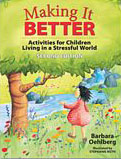
|
Making it Better: Activities for Children Living in a
Stressful World, 2nd Edition. Barbara Oehlberg, $28.95
Speaking to the concept of “trauma-informed” early
childhood education, this book responds to the learning and behavioral needs of
children who have experienced traumatic events or toxic stress — such as natural
disasters, community violence, abuse or neglect within the child's familial
relations, and more. In addition to more than 75 empowering and healing
classroom activities, there is information to help you understand the impact of
children's disrupted attachments and early insecurities, as well as strategies
to help children build resilience. |
Back to top
|
|
Managing an Early Childhood
Classroom: Literacy, Language & Learning. Wendy Koza, $28.50
This practical book will help new and
experienced teachers maintain a developmentally appropriate early childhood
program — including child growth & development, long and short-term
planning, and scheduling and management issues. |
|
Men, Masculinities and Teaching in Early Childhood
Education: International Perspectives on Gender and Care. Edited by Simon
Brownhill, Jo Warin & Inga Wernerson, $60.95
International contributors raise critical questions about
the construction of masculinities, the continuing reluctance of men to engage
in this type of work, and the influence of political and public debates on the
issue. Through this engaging discussion readers are asked to question whether
this is something that we should care about, with key topics including:
- The roles of men in education and care
- Teachers’ beliefs, norms and values of gender equality
- The construction of male identities
- Gendered ideals, and children’s interpretations of gender
Men, Masculinities and Teaching in Early Childhood
Education brings together a refreshing and critical set of
perspectives linked to an increasingly important educational debate and will be
a valuable text for practitioners, professionals, policy makers and
parents/carers. |
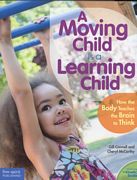
|
A Moving Child Is a Learning Child: How
the Body Teaches the Brain to Think: Gill Connell, Cheryl
McCarthy, $43.50 (Birth to Age 7)
Just as kids’ bodies need specific
nutrients for good health, they also need a balanced diet of physical activity
to help them reach their potential. Authors Gill Connell and Cheryl
McCarthy connect the dots that link brain activity, motor and sensory
development, movement, and early learning. They unveil the Kinetic Scale:
a visual map of the active learning needs of infants, toddlers, preschoolers,
and primary graders (from “snugglers” to “skedaddlers”) that fits each child’s
individual timetable.
Teachers and caregivers will find a wealth of information, actionable
tips, and games they can use to support children’s healthy development—all
presented in a lively, full-color format with demonstrative diagrams and
photos. A final section offers easy-to-implement “Smart Steps at Play”
activities geared to the Kinetic Scale. Downloadable digital
content includes printable versions of charts, “Motorvator” games, and
activities from the book; a PowerPoint presentation for use in professional
development; handouts and activities for parents; and bonus “Smart Steps at
Play” activities.
Grounded in best practices and
current research, A MOVING CHILD IS A LEARNING CHILD is both a
hands-on resource for any classroom teacher, care provider, or parent and an
ideal tool for coaches, mentors, and professional development trainers. |
Back to top
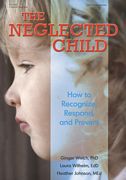
|
The Neglected Child: How to
Recognize, Respond, and Prevent. Ginger Welch,
Laura Wilhelm & Heather Johnson, $19.95
THE NEGLECTED CHILD provides
everything educators and caregivers need to know to identify and intervene in
neglectful situations, while also creating a safe, nurturing, and protective
environment for young children. From defining the different types and levels of
severity of neglect to establishing suspicion and reporting neglectful
situations, this book is filled with helpful information from expert psychologists
and educators in the field today.
Each chapter includes a brief quiz to
assess chapter learning and “Notes from the Field” that represent real-life
stories the authors have encountered in their work. The appendices at the end
of the text include reproducible handouts, sample statements for parent
handbooks, self-assessments for teachers, and important contact information to
use when reporting neglect. |
|
|
Observing and Recording the Behavior of Young
Children, 6th Edition. Dorothy Cohen, Virginia Stern, Nancy Balaban &
Nancy Gropper, $40.50
In the Sixth Edition of their classic text, the authors
reiterate the critical importance of observing and recording the behavior of
young children, especially in the current atmosphere of accountability and
testing. In addition, because children with special needs are now widely
included in a majority of early childhood classrooms, they have completely
rewritten a chapter to focus more broadly on observing behaviors that may be
viewed as disquieting. Designed to help teachers better understand children's
behavior, the book outlines methods for recordkeeping that provide a realistic
picture of each child's interactions and experiences in the classroom. Numerous
examples of teachers' observations of children from birth to age 8 enrich this
work and make it accessible, practical, and enjoyable to read. |
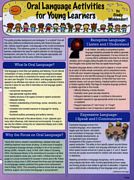
|
Oral
Language Activities for Young Learners. Cindy
Middendorf, $12.95
This 4-page, laminated reference guide
provides background and strategies that will help early childhood professionals
working with 3 to 5 year olds in building the foundation of oral language
skills. |
Back to top

|
Parent-Friendly
Early Learning: Tips and Strategies for Working Well with Parents.
Julie Powers, $28.95
Are you sick of struggling with the parents
of children you work with? Are you dreading upcoming conferences,
or wishing you knew how to approach a difficult topic? Parent-Friendly
Early Learning will help you turn parent problems into warm,
confident relationships … Detailed real-life scenarios in each chapter
will help you create a climate of partnership, understand the background
for each issue, avoid problems, and handle any conflict that does
occur. The practical, user-friendly format allows teachers to start
at any point in the book with the issues that are most pressing
for them. Written for beginning teachers and directors as well as
seasoned professionals, this is the perfect resource for anyone
genuinely interested in working with — not just for — parents.
|
|
Pathways to Competence
for Young Children: a Parenting Program (Book and CD-ROM).
Sarah Landy & Elizabeth Thompson, $79.95 
With Pathways to Competence for Young
Children: a Parenting Program, professionals can help parents
understand and manage their child’s behavior and take an active
role in guiding social-emotional development. Developed from Sarah
Landy’s highly regarded child development book, Pathways
to Competence, this manual-and-CD set shows how to set up,
lead, and evaluate a parenting program for parents of children from
birth to age 7. This one-of-a-kind program is:
- Proven effective.
Field tested for 10 years with hundreds of parents, this
program has proved highly successful in improving child behavior
and enhancing parenting skills.
- Hands-on and practical.
Professionals will learn how to lead group discussions, activities
and exercises, and role-plays on key parenting challenges.
- Versatile. Materials
can be used for a 10-, 15-, or 20-week parenting group, and
professionals can tailor the program to suit their needs. The
program is appropriate for a wide range of audiences, including
parents with depression, teen mothers, and parents of children
with behavior problems.
Everything professionals need to conduct
a Pathways to Competence Parenting Group is included: more
than 140 parent handouts (easy to print from the CD-ROM inside this
book), instructions on structuring and leading sessions, problem-solving
tips, and evaluation guidelines. With this engaging and effective
program, parents will discover how to strengthen their relationships
with their children and foster the healthy social-emotional development
children need to manage life’s challenges. |
|
Play in Early
Childhood from Birth to Six Years, 3rd Edition. Mary Sheridan,
revised by Justine Howard & Dawn Alderson, $26.95
Based on the pioneering work of Mary Sheridan, Play in Early Childhood is a classic introductory text to play and development. Updated for a contemporary audience and fully evidence-based, it explains how children’s play develops and how they develop as they play. With over eighty illustrations and observations of play from birth to six years, this new edition presents classical and contemporary literature, making clear links between play and all areas of children’s development. It includes activities to consolidate thinking and suggestions for further reading throughout. |
Back to top
|
PLAY: the Foundation that Supports the House of Higher
Learning. Lisa Murphy, $26.95
Playing is vital to the social, physical, cognitive and
spiritual development of children. Lisa Murphy's book PLAY reinforces
the importance of playing in the lives of children. Filled with anecdotes,
stories and true to life experiences, she explores the seven things children
need to do — each and every day — and why they are so important. Providing time
and the environment for creating, moving, singing, discussing, observing,
reading, and playing provides children with experiences that prepare them for
school and life-long learning. |
|
Play,
Learning and Brain Development: You Can Make a Difference.
Beatrice Ashem & Michelle Ashem, $29.95 
Play, Learning and Brain Development is a ready-to-use, culturally-adaptable curriculum and guide to
helping parents lean about their child’s development from birth
to age three. Designed for a broad range of use, it can be employed
as a complete set of workshops or adapted to existing programs.
By relating current research data to traditional parenting practices,
the curriculum teaches the effects of parenting practices on brain
development in young children.
Play, Learning and Brain Development is currently being used in cities, small towns and isolated communities
around the world by educators, nurses, early intervention staff,
parents and other community workers. Sections include information,
research and workshops on:
- Brain development in the early years
- Parenting as a key to brain development
- Early learning
- Barriers to healthy development and
prevention strategies
- Maternal depression and other factors
affecting development
- Child abuse and neglect
- Resources
|
| |
Play: The Pathway
from Theory to Practice. Sandra Heidemann & Deborah Hewitt,
$45.25
Play: The Pathway from Theory to Practice contains
practical suggestions and theoretical information for helping
children thrive with play-based learning. Chapters include an
explanation of the functional "Play Checklist" to help
you observe children's emerging skills and pinpoint areas for
improvement, instructions for writing specific and attainable
goals for children, and case studies from real classrooms. |
Back to top
|
Promoting School Readiness and Early
Learning: Implications of Developmental Research for Practice. Edited by Michel Boivin & Karen
Bierman, $66.50
Grounded in cutting-edge developmental
research, this book examines what school readiness entails and how it can be
improved. Compelling longitudinal findings are presented on the benefits of
early intervention for preschoolers at risk due to poverty and other factors.
The volume identifies the cognitive, language, behavioral, motor, and socio-emotional
skills that enable young children to function successfully in school contexts.
It explores specific ways in which school- and family-based interventions — including
programs that target reading and language, math, self-regulation, and
social-emotional development — can contribute to school readiness. The book also
addresses challenges in the large-scale dissemination of evidence-based
practices. |
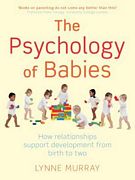
|
The Psychology of Babies: How Relationships Support
Development From Birth to Two. Lynne Murray, $32.00
An instructive and accessible account of the
psychological development of children aged 0-2 years and how it can be
supported by social relationships. The first two years are critical in a
child's development, influencing what happens in later childhood and even
adulthood. Yet how best to support that early development is not always easy to
grasp. Now help is at hand with this expert guide on the care of children
through these essential years.
Based on the latest research, with its wealth of picture
sequences and clear explanations, this book shows how the development of young
children's social understanding, attachments, self-control and intelligence can
be supported through their relationships. |
|
Reaching and Teaching Children Exposed to Trauma. Barbara
Sorrels, $22.95
What does a harmed child look like? It’s the little girl
on the playground who has mysterious bruises on her legs. It’s the
three-month-old baby boy who arches his back when you try to hold him. It’s the
four-year-old who bites and hits when asked to clean up. These are the faces of
traumatized children. As an early childhood professional, you play a key role
in the early identification of maltreatment and unhealthy patterns of
development. You are also the gateway to healing. In Reaching and Teaching
Children Exposed to Trauma, you will find the tools and strategies to connect
with harmed children and start them on the path to healing. Dr. Sorrels offers
practical strategies that caregivers need to help these littlest victims:
- Connecting with a harmed child using games, music, gentle touch,
and play
- Meeting children’s sensory needs throughout the day: morning
arrival, group time, meal times, outdoor play, and naptime
- Creating a sensory-rich classroom environment with easy, simple
ideas
- Teaching a traumatized child self-regulation skills and impulse
control using visual cues, rehearsal and role play, games, and scripted stories
- Coaching and supporting social skills: turn taking, sharing,
joining in play, empathy, and conflict resolution
- Communicating unconditional love and acceptance to children from
hard places
|
Back to top
|
|
Rethinking Nutrition: Connecting Science and Practice
in Early Childhood Settings, Revised Edition. Susan Nitzke, Dave
Riley, Ann Ramminger & Georgine Jacobs, $36.95
Nutrition has vital and long-lasting effects on
children's development. Good nutrition helps children learn better and promotes
lifelong healthy eating habits. Connecting current scientific research with
best practices, Rethinking Nutrition provides information to
help you meet and understand children's nutritional and developmental
needs.
Each chapter also provides a series of examples that
bring nutrition principles to life in early childhood settings, topic
suggestions for staff discussions, sample letters to families, and a list of
further readings. Extensive appendixes provide additional information on
federal nutrition regulations, preventing food-borne illnesses, and more. |
|
Risk, Challenge and Adventure in the Early Years: a
Practical Guide to Exploring and Extending Learning Outdoors. Kathryn
Solly, $48.95
What is the difference between ‘risk’ and ‘danger’? What
can children learn from taking risks? How can you provide key experiences for
children and ensure their safety outdoors? Young children will naturally seek
out challenges and take risks and this is crucial to their overall development.
This book clearly explains why children should be given the freedom to take
risks and provides practical guidance on how to offer stimulating and
challenging outdoor experiences that will extend all areas of children’s
learning.
Including examples of activities for all weather
conditions across all areas of learning, the book covers:
- The pedagogical history of adventure, risk and challenge
- Health, wellbeing and keeping safe
- The adult role
- Risk assessment
- Supporting individual children with different needs
- Environments that enable challenging and adventurous play
- Working with parents and addressing concerns
- Observation, planning and assessment
This book is essential reading for practitioners and
students that wish to provide rich experiences for children that will enable
them to become confident and adventurous learners. |
|
|
Routines
& Transitions: a Guide for Early Childhood Professionals.
Nicole Malenfant, $43.95
Routines and Transitions is
a complete guide to help you turn the most common daily activities,
such as hand washing, snack time, and naps, into nurturing learning
experiences for children ages birth to five. By using transitions
wisely, you not only contribute to children's developing skills
but also run a more efficient program and create a calmer early
childhood setting. In addition to discussions on developmental issues,
environments, educational values, and hygiene, there are examples
of the kinds of games and rhymes that help children move through
their daily transitions with ease. |
Back to top
|
|
The Secure Child:
Timeless Lessons In Parenting and Childhood Education. Edited
by Richard Volpe, $55.50 
Just as ideas in child psychology shifted in the 1960s from a focus on behavior to cognitive stages, we are currently seeing a shift away from stages of development toward an emphasis on the interplay between children and the world around them. The Secure Child offers practical insights into how children can be helped to cope with their changing worlds. These insights emerged in the 1930s, a time of social and economic upheaval much like today. This collection of original papers by former students and colleagues of William E. Blatz, the renowned psychologist and pediatrician, makes a vital contribution by bringing forward and examining his work in the context of contemporary ideas about human development, parenting, and education. The collection forms a prologue to an included guide written by Blatz and colleagues, The Expanding World of the Child. The previously unpublished work articulates a comprehensive functional approach to parenting and childhood education. The unique format of this book will make it useful for courses in parenting, childhood education as well scholarship in child psychology, personality theory, and socialization. |
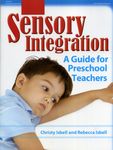
|
Sensory Integration:
a Guide for Preschool Teachers. Christy Isbell & Rebecca
Isbell, $23.95
Sensory Integration: a Guide for
Preschool Teachers helps you identify children who have difficulties
with sensory processing, and it offers simple, easy-to-use solutions
to support the sensory needs of young children in the preschool
classroom. Easy-to-implement solutions include adaptations and activities
for children with different types of Sensory Processing Disorder.
This book has a bonus chapter with instructions for creating low-cost
items to help children with sensory issues. |
|
|
Skillstreaming in Early Childhood: a
Guide for Teaching Prosocial Skills, 3rd Edition. Ellen McGinnis, $56.95
SKILLSTREAMING employs a four-part
training approach — modeling, role-playing, performance feedback, and
generalization — to teach essential prosocial skills to preschool
and kindergarten-age children. The book provides a
complete description of the Skillstreaming program, with instructions for
teaching prosocial skills.
This widely acclaimed approach developed
by Dr. Arnold Goldstein and colleagues is now in 8½×11 format with reproducible
skill outlines, skill homework reports, and program forms and includes
forms CD. |
Back to top
|
|
Social
& Emotional Development: Connecting Science and Practice an
Early Childhood Settings. Dave Riley, et al, $29.95
Find out what the research says about
common early childhood program practices, such as playing "Simon
Says" or holding children while feeding them—time-tested activities
you intuitively know help young children. Social and Emotional
Development explores the effectiveness of these early learning
tools and helps answer the question, "Why do we do what we
do?" |
|
Social and Emotional Well-Being: Activities for Age 3
to Kindergarten, 3rd Edition. Connie Jo Smith, Charlotte Hendricks &
Becky Bennett, $21.50
Children's social and emotional skills form a critical
foundation for learning and wellness that guide them into adulthood and
influence how they deal with both successes and adversity in life. These
activities support children as they learn about self-esteem, emotions and
feelings, family and friends, and changes in life. This book includes:
- An overview of the social and emotional well-being topics covered
in the curriculum
- Suggested interest area materials and supports for creating the
learning environment
- Learning objectives and vocabulary words
- Suggestions for evaluating children's understanding of each
social and emotional well-being topic
- More than 30 classroom activities
- Family information and take-home activities
|
|
|
Supporting Language and Literacy 0-5: a Practical Guide for the Early Years Foundation Stage. Suzi Clipson Boyles, $41.95
Supporting Language and Literacy 0–5 describes the important features of early language development providing a clear and accessible theoretical framework illustrated by practical examples taken from a wide range of early years settings. The book focuses on the principles of inclusion, equality, individualized learning, planning, assessment and cross-curricular working that play a vital part in delivering the EYFS successfully. |
Back to top
|
|
Theories of Childhood, 2nd Edition: an Introduction to Dewey, Montessori, Erikson, Piaget & Vygotsky. Carol Garhart Mooney, $29.95
Examine the work of five groundbreaking
education theorists — John Dewey, Maria Montessori, Erik Erikson, Jean Piaget,
and Lev Vygotsky — in relation to early childhood, THEORIES OF CHILDHOOD provides
a basic introduction to each theorist and explains the relationship of theory
to practice and its impact on real children, teachers, and classrooms. This
edition reflects current academic learning standards and includes new
understandings of Vygotsky's work. It is a popular guide to help you be aware
of the theories behind good child care practices. It is also a widely-used text
in undergraduate programs, community college courses, and training workshops
that focus on early development and education. |
|
|
Tools
for Transition in Early Childhood: a Step-by-Step Guide for Agencies,
Teachers, and Families. Beth Rous & Rena Hallam, $39.95
For young children with and without disabilities,
positive outcomes depend on smooth, effective transitions between
and within early intervention programs, preschool programs, and
public school programs. Tools for Transition in Early Childhood
is a how-to guide that guides professionals across programs
in working together to make these transitions happen. Tools
for Transition in Early Childhood is an essential guidebook
for program directors, administrators, and all their staff members,
helping programs coordinate their services and plan transitions
that ensure young children's school readiness. |
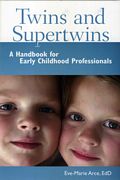
|
Twins and Supertwins: a Handbook for Early Childhood Professionals. Eve-Marie Arce, $37.50
This practical handbook helps educators to support the unique needs of multiples in their physical, social, language and emotional development. Based on current research and observations in preschool settings, this book helps educators foster relationships with parents and create guidelines within your setting for working with twins, triplets and higher multiples. |
Back to top
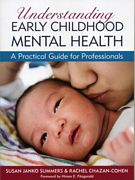
|
Understanding Early
Childhood Mental Health: a Practical Guide for Professionals. Susan
Janko Summers & Rachel Chazan-Cohen, $57.95
Integrating infant mental health
services into early education programs leads to better child outcomes and stronger
parent–child relationship. The big question is how to do it appropriately and
effectively. Clear answers are in this accessible textbook, created to prepare
early childhood professionals and programs to weave best practices in mental
health into their everyday work.
This introductory text is a primer
on infant mental health, strengthening the reader's knowledge of key issues
such as screening and assessment, attachment, emotional dysregulation and
aggression, risk and resilience, maternal depression, and children's exposure
to trauma. The book also includes practical, research-based guidance that can
be used to recognize indicators of mental health problems in very young
children, including emotional dysregulation and behavioral and developmental
changes. |
|
Understanding
Infant Development. Margaret Puckett, Janet Black &
Joseph Moriarity, $22.95
Understanding Toddler Development.
Margaret Puckett, Janet Black & Joseph Moriarity, $22.95
Understanding Preschooler Development.
Margaret Puckett, Janet Black & Joseph Moriarity, $22.95
Learn how to support children's physical,
cognitive, emotional, and social development with this series of
three practical handbooks, adapted from The Young Child,
a textbook used in academic programs nationwide. The Understanding
Child Development Series provides a comprehensive overview
of the most relevant theories and research on child development.
Each book focuses on a specific age group and explains:
- the impact and long-term effects of
biology and environment on early brain development
- how children learn
- important theories of child development
- how early life experiences lay the
ground work for evolving language and thinking
- the effects of nurturing care on emotional
development and stability in later life
- milestones and windows of opportunity
for children's development
|
|
|
|
The Wiley-Blackwell Handbook of
Childhood Cognitive Development, 2nd Edition. Usha Goswani, Editor, $56.95
This definitive volume is the result of
collaboration by top scholars in the field of children's cognition. This new
edition:
- Offers an up-to-date overview of all the major
areas of importance in the field, and includes new data from cognitive
neuroscience and new chapters on social cognitive development and
language
- Provides state-of-the-art summaries of current
research by international specialists in different areas of cognitive
development
- Spans aspects of cognitive development from
infancy to the onset of adolescence
- Includes chapters on symbolic reasoning, pretend
play, spatial development, abnormal cognitive development and current
theoretical perspectives
|
Back to top
|
|
Wired to Move: Facts and Strategies for Nurturing
Boys in an Early Childhood Setting. Ruth Hanford
Morhard, $21.95
Learn what makes boys tick (and run and
jump and yell), and discover how to actively engage the boys in your early
childhood classroom with simple effective strategies that support boys’
learning. Using the latest brain research to explore and explain the
differences in how boys and girls learn, WIRED TO MOVE provides early
childhood educators with facts and strategies to actively engage boys in an
early childhood setting. Author Ruth Hanford Morhard addresses the unique needs
of African-American and Hispanic or Latino boys while offering guidance for
encouraging family engagement and parent participation. WIRED TO MOVE is
filled with practical strategies that teachers can easily implement in even the
stickiest situations, from media exposure to superhero play.
Additionally, WIRED TO MOVE includes numerous resources including
book lists, websites, and parent handouts to further assist parents and
educators create a “boy-friendly” environment. |
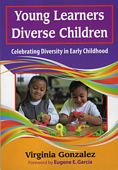
|
Young Learners, Diverse Children: Celebrating
Diversity in Early Childhood. Virginia
Gonzalez, $53.95
Nurture young children’s self-esteem
and boost learning by integrating family culture with instruction!
For the increasing number of diverse
young learners, academic and social success can hinge on a teacher’s
ability to bridge home and school by making emotional connections
with students and their families. This book demonstrates how
combining teaching methods with an authentic appreciation of
children’s backgrounds builds the confidence they need
to succeed. |
|
Your Self-Motivated Baby: Enhance Your Baby's Social
and Cognitive Development in the First Six Months of Life through Movement. Beverly
Stokes, $32.49
A hands-on guide for communicating with babies in their
first six months and nurturing their physical, social, and cognitive
development, Your Self-Motivated
Baby shows parents and other caregivers how to interact with very young infants
and understand what they are expressing in their movements. Color photographs
throughout the book show babies' motivation in play and how subtle interactions
build bonding and encourage development. Following advice from author Beverly
Stokes, a seasoned developmental movement educator, adults learn how to relate
to babies and communicate effectively with them. Beverly Stokes makes it clear
that preverbal babies are giving cues for caregiver participation very early
on; it's up to us to try to understand them better. By communicating with
babies sensitively in the first six months of their lives, we help them to
establish the foundation for a healthy, confident, and joyful life. |
Back to top
Complete
Booklist
Ages and Stages: Developmental Descriptions & Activities Birth through Eight Years, 2nd Edition. Karen Miller, $27.95
Ants in Their Pants: Teaching Children Who Must Move to
Learn. Aerial Cross, $39.95
The Art of Awareness: How Observation
Can Transform Your Teaching, 2nd Edition. Deb Curtis & Margie Carter, $58.95 (ages birth to 5)
Behaviour in the Early Years, 2nd Edition. Angela Glenn,
Jacquie Cousins & Alicia Helps, $36.50
Behavioral Challenges in Early Childhood Settings. Connie Jo Smith, $19.95
Beyond Behavior Management: the Six Life Skills Children
Need, 2nd Edition. Jenna Bilnes, $41.95
By the Ages: Behavior & Development of Children Pre-Birth through Eight. K.Eileen Allen & Lynn R. Marotz, $33.95
Caring for Infants and Toddlers in Groups: Developmentally Appropriate Practice (2nd Edition). ZERO TO THREE, $36.95
Challenging Behaviors in Early Childhood Settings: Creating
a Place For All Children. Susan Hart Bell, $32.95
The Challenging Child: Understanding, Raising, and Enjoying the Five “Difficult” Types of Children.S. Greenspan, $19.95
Challenging the Challenging Behaviours: a Sourcebook Based
on the SpecialLink Institute on Challenging Behaviours in Child Care.
Sharon Irwin (ed), $25.00
Child Development for Child Care and Protection Workers, 2nd Edition. Brigid Daniel, Sally Wassell & Robbie Gilligan, $34.95
Child Development: a Practitioner's Guide, 3rd Edition.
Douglas Davies, $71.95
Childhood in a Global Perspective. Karen Wells, $29.95
Childminder's Guide to Child Development. Allison Lee, $36.95
Children’s Communication Skills from Birth to Five Years. Belinda Buckley, $43.95
Common Psychological Disorders in Young Children: a Handbook for Child Care Professionals. Jenna Bilmes & Tara Welker, $34.95
Community and Environment: Activities for Age 3 to
Kindergarten, 3rd Edition. Connie Jo Smith, Charlotte Hendricks & Becky
Bennett, $17.95
The Crisis Manual for Early Childhood Teachers: How to
Handle Really Difficult Problems. Karen Miller, $49.95
Culture and Child Development in Early Childhood Programs: Practices for Quality Education and Care. Carollee Howes, $36.95
Developing Attachment in Early Years Settings:
Nurturing Secure Relationships from Birth to Five Years. Veronica Read,
$48.95
The Developing Brain Birth to Age Eight. Marilee Sprenger, $21.95
Developing Thinking &
Understanding in Young Children, 2nd Edition. Sue Robson, $45.50
The Development of Children. Michael Cole & Sheila Cole, $109.95
A Developmental Approach to Educating Young Children. Denise Daniels & Patricia Clarkson, $40.75
Developmental Parenting: a Guide for Early Childhood Practitioners.
Roggman, Boyce & Innocenti, $45.95
Developmental Profiles: Pre-Birth through Twelve, 5th Edition. K. Eileen Allen & Lynn Marotz, $71.95
Developmentally Appropriate Practice
in Early Childhood Programs, 3rd Edition: Serving Children from
Birth through Age 8. Carol Copple & Sue
Bredekamp, Editors, $47.99
Don’t Get So Upset! Help Young Children Manage Their Feelings by Understanding Your Own — a Guide for Caregivers. Tamar Jacobson, $19.50
Dual Language Learners in the Early
Childhood Classroom. Edited by Carollee Howes,
Jason Downer & Robert Pianta, $40.95
Back to top
Eager to Learn: Educating Our Preschoolers. B. Bowman & M. S Burns, (eds), $53.95
Early Childhood Curricula and the De-pathologizing of Childhood. Rachel Heydon & Luigi Iannacci, $24.95
Early Childhood Theories and Contemporary Issues: an
Introduction. Mine Conkbayier & Christine Pascal, $34.50
Early Sprouts: Cultivating Healthy Food Choices in Young
Children. Carrie Kalich, Dottie Bauer & Deirdre McPartlin, $28.95
Easy Daily Plans: Over 250 Plans for Preschool Teachers.
Sue Fleischmann, $34.95
Emergent Literacy and Language Development: Promoting Learning in Early Childhood. Paula Rhyner, Editor, $42.95
The Emotional Life of the Toddler. Alicia F. Lieberman, $21.50
Enhancing Early Child Development: a
Handbook for Clinicians. Durriyah Sinno, Lama
Charafeddine & Mohamad Mikati, $42.95
Enhancing Early Emotional Development: Guiding Parents of Young Children. Jean Wixson Gowen & Judith Brennan Nebrig, $37.50
Enhancing Learning through Play: a
Developmental Perspective for Early Years Settings, 2nd Edition. Christine Macintyre, $38.95
The Essence of Play: a Practice Companion for
Professionals Working with Children and Young People. Justine Howard & Karen McInnes, $43.95
The Feeling Child: Laying the Foundations of
Confidence and Resilience. Maria Robinson, $36.95
First Feelings, Revised Edition. Stanley Greenspan & Nancy Thorndike Greenspan, $19.99
Fitness and Nutrition: Activities for Age 3 to
Kindergarten, 3rd Edition. Connie Jo Smith, Charlotte Hendricks & Becky
Bennett, $17.95
Focused Portfolios: a Complete Assessment for the Young Child. Gaye Gronlund & Bev Engel, $57.95
Getting It Right for Boys: Why Boys
Do What They Do and How to Make the Early Years Work for Them. Neil Farmer, $30.00
Good Going! Successful Potty Training for Children in
Child Care. Gretchen Kinnell, $14.95
Good Morning, Children: My First Years in Early Childhood Education. Sophia Pappas, $20.95
The Great Disconnect in Early Childhood Education:
What We Know vs. What We Do. Michael Gramling, $33.95
Growing Minds: Building Strong
Cognitive Foundations in Early Childhood. Edited by Carol Copple, $29.99
Guiding Young Children in a Diverse Society. Ann Gordon & Kathryn Williams Browne, $81.60
Handbook of Child Development and Early Education: Research to Practice. Edited by Oscar Barbarin & Barbara Hanna Wasik, $93.50
How the Child’s Mind Develops, 2nd Edition. David Cohen, $43.50
How to Handle Hard-to-Handle Preschoolers: a Guide for
Early Childhood Educators. Maryln Appelbaum, $27.95
Inclusive Lesson Plans Throughout the Year: Early Childhood.
Laverne Warner, Sharon Lynch, Cynthia Simpson & Diana Nabors, $34.95
Incredible Teachers: Nurturing Children’s Social,
Emotional, and Academic Competence. Carolyn Webster-Stratton, $42.95
Infant & Toddler Child Development. Kay Albrecht & Linda Miller, $65.95
Infant and Toddler Experiences. Fran Hast &
Ann Hollyfield, $34.95
Intellectual Development: Connecting Science and Practice in Early Childhood Settings. Riley, Carns, Ramminger, Klinkner & Sisco, $29.95
Introducing Piaget: a Guide for Practitioners and
Students in Early Years Education. Ann Marie
Halpenny & Jan Pettersen, $37.50
Keeping the Peace: Practicing Cooperation and Conflict Resolution with Preschoolers. Susanne Wichert, $17.95
Kids Can Cooperate: a Practical Guide to Teaching Problem Solving. Elizabeth Crary, $17.95
Knowledge Development in Early
Childhood: Sources of Learning and Classroom Implications. Edited by Ashley Pinkham, Tanya Kaefer & Susan Neuman, $44.50
Back to top
Learning from Head Start: a Teacher’s
Guide to School Readiness. Edited by Sidney
Gilford, $41.95
Learning Through Child Observation, 2nd Edition. Mary Fawcett, $35.95
Learning Together With Young Children: a Curriculum Framework
for Reflective Teachers. Deb Curtis & Margie Carter, $58.95
Let Them Play: an (un)Curriculum. Jeff Johnson & Denita Dinger, $39.95 (ages 2-6)
LINKing Authentic Assessment and Early Childhood Intervention: Best Measures for Best Practices, 2nd Edition. Stephen Bagnato, John Neisworth & Kristie Pretti-Frontczak, $54.95
Little Kids, Big Worries: Stress-Busting Tips for Early
Childhood Classrooms. Alice Sterling Honig, $29.95
Making It Better: Activities for Children Living in a Stressful World, 2nd Edition. Barbara Oehlberg, $28.95
Managing an Early Childhood Classroom: Literacy, Language
& Learning. Wendy Koza, $28.50
Me, Myself and I: How Children Build Their Sense of Self, 18-36 Months. Kyle D. Pruett, $27.95
Men, Masculinities and Teaching in Early Childhood
Education: International Perspectives on Gender and Care. Edited by Simon
Brownhill, Jo Warin & Inga Wernerson, $60.95
A Moving Child Is a Learning Child: How
the Body Teaches the Brain to Think: Gill Connell, Cheryl
McCarthy, $43.50 (Birth to Age 7)
The Neglected Child: How to
Recognize, Respond, and Prevent. Ginger Welch,
Laura Wilhelm & Heather Johnson, $19.95
Observing and Recording the Behavior of Young
Children, 6th Edition. Dorothy Cohen, Virginia Stern, Nancy Balaban &
Nancy Gropper, $40.50
Oral
Language Activities for Young Learners. Cindy
Middendorf, $12.95
Parent-Friendly Early Learning: Tips and Strategies for Working Well with Parents. Julie Powers, $28.95
Pathways to Competence: Encouraging Healthy Social and
Emotional Development in Young Children, 2nd Edition. Sarah Landy,
$65.95
Pathways to Competence for Young Children: a Parenting
Program (Book and CD-ROM). Sarah Landy & Elizabeth Thompson, $79.95
Perspectives on Gender in Early Childhood. Edited by Tamar Jacobson, $55.95
Play in Early Childhood from Birth to Six Years, 3rd Edition.
Mary Sheridan, revised by Justine Howard & Dawn Alderson, $26.95
PLAY: the Foundation that Supports the House of Higher
Learning. Lisa Murphy, $26.95
Play, Learning and Brain Development: You Can Make a Difference. Beatrice Ashem & Michelle Ashem, $29.95
Play: the Pathway from Theory to Practice. Sandra Heidemann
& Deborah Hewitt, $45.25
Positive Child Guidance, Revised 2004. Darla Ferris Miller, $57.95
Positive Discipline for Childcare Providers: a Practical and Effective Plan for Every Preschool and Daycare Program. Jane Nelsen & Cheryl Erwin, $25.95
Back to top
The Power of Guidance: Teaching Social-Emotional Skills in Early Childhood Classrooms. Dan Gartrell, $22.95
Practical Solutions to Practically Every Problem: the
Early Childhood Teacher's Manual, 2nd Edition. Steffen Saifer, $34.95
Preschool Assessment: Principals and Practices. Marla Brassard & Ann Boehm, $56.95
Promoting School Readiness and Early
Learning: Implications of Developmental Research for Practice. Edited by Michel Boivin & Karen
Bierman, $66.50
The Psychology of Babies: How Relationships Support
Development From Birth to Two. Lynne Murray, $32.00
Reaching and Teaching Children Exposed to Trauma. Barbara
Sorrels, $22.95
Respecting Babies: a New Look at Magda Gerber’s RIE Approach. Ruth Anne Hammond, $28.95
Rethinking Nutrition: Connecting Science and Practice
in Early Childhood Settings, Revised Edition. Susan Nitzke, Dave
Riley, Ann Ramminger & Georgine Jacobs, $36.95
Risk, Challenge and Adventure in the Early Years: a
Practical Guide to Exploring and Extending Learning Outdoors. Kathryn
Solly, $48.95
Routines & Transitions: a Guide for Early Childhood Professionals. Nicole Malenfant, $43.95
See How They Grow: Infants & Toddlers. Sue Martin, $79.95
The Secure Child: Timeless Lessons In Parenting and Childhood
Education. Edited by Richard Volpe, $55.50
Sensory Integration: a Guide for Preschool Teachers. Christy
Isbell & Rebecca Isbell, $23.95
Skillstreaming in Early Childhood: a
Guide for Teaching Prosocial Skills, 3rd Edition. Ellen McGinnis, $56.95
Social & Emotional Development: Connecting Science
and Practice an Early Childhood Settings. Dave Riley, et al, $29.95
Social and Emotional Well-Being: Activities for Age 3
to Kindergarten, 3rd Edition. Connie Jo Smith, Charlotte Hendricks &
Becky Bennett, $21.50
So This Is Normal Too? Teachers and Parents Working Out Developmental Issues in Young Children. D. Hewitt, $24.95
Supporting Language and Literacy 0-5: a Practical Guide for the Early Years Foundation Stage. Suzi Clipson Boyles, $41.95
Take a Look: Observation and Portfolio Assessment in Early
Childhood, 2013 Edition. Sue Martin, $117.90
Theories of Childhood, 2nd Edition: an Introduction to Dewey, Montessori, Erikson, Piaget & Vygotsky. Carol Garhart Mooney, $29.95
Tools for Transition in Early Childhood: a Step-by-Step Guide for Agencies, Teachers, and Families. Beth Rous & Rena Hallam, $39.95
Twins and Supertwins: a Handbook for Early Childhood Professionals. Eve-Marie Arce, $37.50
Understanding Early Childhood Mental Health: a Practical
Guide for Professionals. Susan Janko Summers & Rachel Chazan-Cohen,
$57.95
Understanding Infant Development. Margaret Puckett, Janet
Black & Joseph Moriarity, $22.95
Understanding Preschooler Development. Margaret Puckett,
Janet Black & Joseph Moriarity, $22.95
Understanding Toddler Development. Margaret Puckett, Janet
Black & Joseph Moriarity, $22.95
The Value of Play. Perry Else, $49.95
What to Do When: Practical Guidance Strategies for Challenging
Behaviors in the Preschool, 6th Edition. Eva Essa, $70.95 (previously
called "A Practical Guide to Solving Preschool Behavior Problems")
The Wiley-Blackwell Handbook of
Childhood Cognitive Development, 2nd Edition. Usha Goswani, Editor, $56.95
Wired to Move: Facts and Strategies for Nurturing
Boys in an Early Childhood Setting. Ruth Hanford
Morhard, $21.95
Young Learners, Diverse Children: Celebrating Diversity in Early Childhood. Virginia Gonzalez, $53.95
Your Self-Motivated Baby: Enhance Your Baby's Social
and Cognitive Development in the First Six Months of Life through Movement. Beverly
Stokes, $32.49
Back to top

Didn't
find it...?
Not sure...?
Need a suggestion...?
There are over 10,000 titles listed on our website and more than 35,000 titles in our inventory. If you haven't found what you want on the website — and it's one of our specialties — chances are good that we carry it, or can get it for you. Just let us know what you're looking for.
Call us toll-free 1-800-209-9182
or e-mail
PARENTBOOKS
is pleased to invoice institutions. Please inquire regarding terms and
discounts. Shop in person, by phone, fax, mail or e-mail . VISA, Mastercard
and Interac are welcome. We are open from 10:30 to 6:00 Monday through Friday and from 11:00 to 5:00 on Saturday.
 All prices are in Canadian dollars
and are subject to change without notice. All prices are in Canadian dollars
and are subject to change without notice.

|